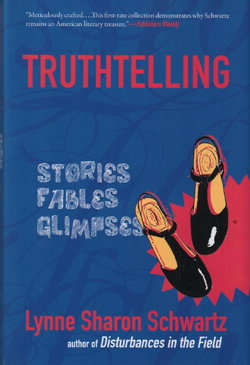Truthtelling: Stories, Fables, Glimpses by Lynne Sharon Schwartz, Delphinium Books, ISBN 9781883-285920; 240 pages, $24.95.

 SAN DIEGO –The prolific author Lynne Sharon Schwartz has put together a collection of 25 of her short stories that have appeared in a variety of publications, calling the resulting book Truthtelling. To go on sale on October 6, the slim volume makes for engaging reading in short, concentrated bursts. The first story in the book, also called “Truthtelling,” tells of a long-married couple exchanging confessions about misdeeds during their marriage.
SAN DIEGO –The prolific author Lynne Sharon Schwartz has put together a collection of 25 of her short stories that have appeared in a variety of publications, calling the resulting book Truthtelling. To go on sale on October 6, the slim volume makes for engaging reading in short, concentrated bursts. The first story in the book, also called “Truthtelling,” tells of a long-married couple exchanging confessions about misdeeds during their marriage.
Many of the subsequent stories involve people with an excess of imagination, occasionally bordering on paranoia. In one, a young woman worries how angry her mother will be because she hasn’t called her in a long time. In another, a woman imagines all sorts of evil outcomes while riding public transit. In a third, a young, expressionless girl gains energy and ballet prowess after she eats a special apple, but what will happen if the apple supply runs out?
The story to which I paid the closest attention had a Jewish angle called, “But I Digress.” It starts off with a wealthy Russian announcing he plans to leave New York for Florida where he can find other Russians. But what about Brighton Beach, weren’t there plenty of Russians there? No, the man answered, they are not real Russians (they are Jews.) But later in the story, after numerous digressions, we find prejudice is not uniquely aimed against Jews, nor are Jews immune from practicing it. When the story teller’s Jewish father is dying in the hospital, he wouldn’t respond to his nurses, one of whom came from the Mdwest, another from the Philippines, and a third from Poland. “You can’t trust any of them,” he told his visiting daughter.
How does a short story writer as accomplished as Schwartz get so many ideas? She provides insight into this process in her story “Tree of Porphyry,” which begins with a man telling a woman who is trying to restrain a dog from burrowing into a clump of leaves and dirt by the base of a tree, “I try to give my dog the chance to be a dog whenever I can.”
Based on that simple statement, Schwartz offers a myriad of twists that a plot might take from there. Maybe the woman had a reason for tugging at the dog, perhaps the dog had an allergy. Or maybe the dog didn’t belong to the woman. On the other hand, perhaps the dog was her substitute for a child, after she had been abandoned by her lover. Maybe the man had made the comment as a pick up line. And, by the way, what do we mean when we say we “own” a dog? Can a dog be owned? On and on, Schwartz’s mind spins, with us, the readers, joining her on the Ferris Wheel.
Various readers will find one story or another to enjoy in this group of 25. Among this set, surely you’ll find some that will inspire you to explore new, intriguing thoughts.
*
Donald H. Harrison is editor of San Diego Jewish World. He may be contacted via donald.harrison@sdjewishworld.com